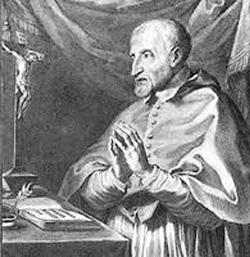Saint of the Day Online - St Robert Bellarmine
Saint of the day online, Sunday, September 17, 2017
17-09-2017
Saint Name: Robert Bellarmine
Place: Italy
Birth:4 October 1542
Death: 1621
Feast: September 17
Saint Robert Bellarmine who was born on 4 October 1542 was an Italian Jesuit and a Cardinal of the Catholic Church. He was one of the most important figures in the Counter-Reformation.
Robert entered the newly formed Society of Jesus in 1560 and after his ordination went on to teach at Louvain (1570-1576) where he became famous for his Latin sermons. In 1576, he was appointed to the chair of controversial theology at the Roman College, becoming Rector in 1592; he went on to become Provincial of Naples in 1594 and Cardinal in 1598.
This outstanding scholar and devoted servant of God defended the Apostolic See against the anti-clericals in Venice and against the political tenets of James I of England. He composed an exhaustive apologetic work against the prevailing heretics of his day. In the field of church-state relations, he took a position based on principles now regarded as fundamentally democratic - authority originates with God, but is vested in the people, who entrust it to fit rulers.
In 1616, on the orders of Paul V, Bellarmine summoned Galileo, notified him of a forthcoming decree of the Congregation of the Index condemning the Copernican doctrine of the mobility of the Earth and the immobility of the Sun, and ordered him to abandon it. Galileo agreed to do so.
Bellarmine's books bear the stamp of their period; the effort for literary elegance (so-called "maraviglia") had given place to a desire to pile up as much material as possible, to embrace the whole field of human knowledge, and incorporate it into theology. His controversial works provoked many replies, and were studied for some decades after his death. At Leuven he made extensive studies in the Church Fathers and scholastic theologians, which gave him the material for his book De scriptoribus ecclesiasticis (Rome, 1613). It was later revised and enlarged by Sirmond, Labbeus, and Casimir Oudin. Bellarmine wrote the preface to the new Sixto-Clementine Vulgate.
This saint was the spiritual father of St. Aloysius Gonzaga, helped St. Francis de Sales obtain formal approval of the Visitation Order, and in his prudence opposed severe action in the case of Galileo. He has left us a host of important writings, including works of devotion and instruction, as well as controversy. He died in 1621.